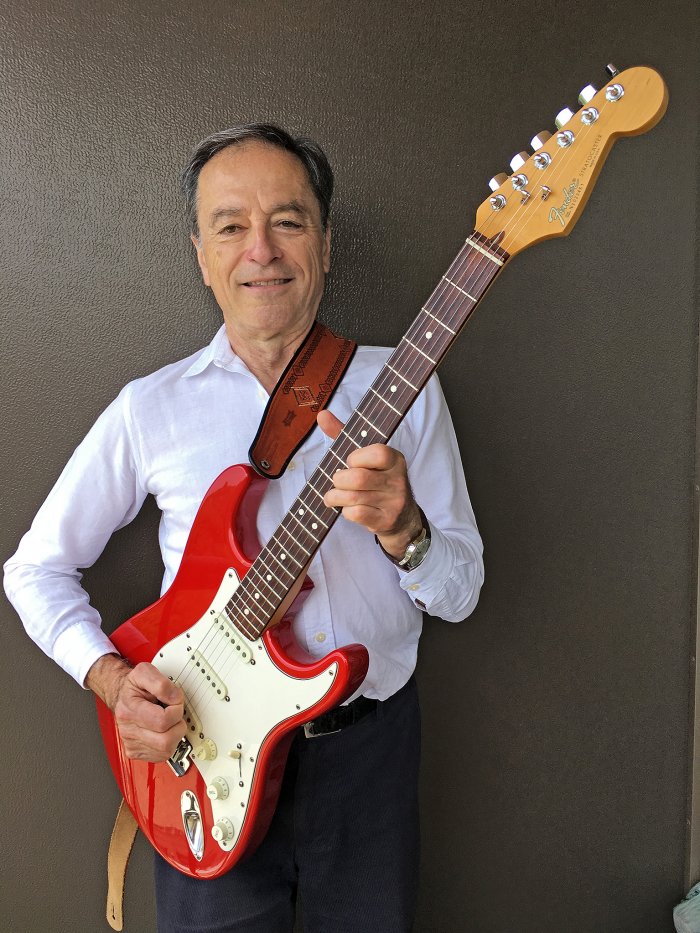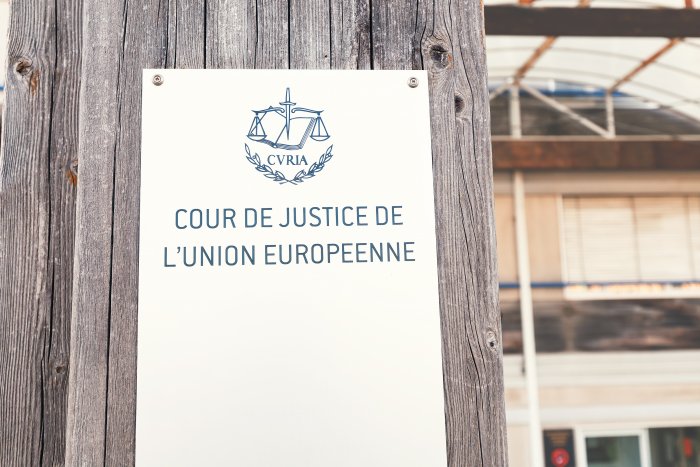When Rock ‘n’ Roll met Communism, There was Only Going to be 1 Winner

Traffic, the U.K. foursome famous for their flower-power hit “Hole in My Shoe”, were one of the first Western rock acts to play in communist Hungary. It was 1968, and even though they had sanctioned it, the authorities were less than happy with the band’s presence.
András Simonyi with his red Stratocaster, which he got for his 40th birthday.
As the musicians took to the stage, police, uniformed and plain clothed, watched intently for any sign of “irregular behavior” among the crowd, straining to catch the merest whisper of an anti-government utterance.
But after a couple of numbers, the mood relaxed a little: the crowd, it seemed, knew their limits. It was then that Steve Winwood, Traffic’s front man, calmly announced: “The next song we would like to dedicate to the police. It’s called ‘Who Knows What Tomorrow May Bring’.”
Was this a joke? A provocation? Didn’t these guys know you don’t mess with communist police?
“We froze. Hundreds, maybe thousands, of kids all froze. Will they stop the concert? Take them away in handcuffs?”
András Simonyi, then a Budapest teenager besotted by Western rock music in general and Traffic in particular, recalls this pivotal, if not prophetic, moment half a century later in “Rocking Toward a Free World: When the Stratocaster beat the Kalashnikov”.
Across 320 pages, Simonyi describes the trauma, tensions, heartache and absurdities of a rock fan growing up behind the Iron Curtain, where the best music lovers could hope for was an illicit listen to the Doors, Animals or Who on Radio Free Europe; this at a time their U.S. and Western European peers could see such acts live for three dollars or less.
Musical Epiphany
Simonyi’s anguished musical development in Hungary was all the more difficult to endure because he had spent time in the West. As a boy, his father, a civil servant, was posted to Denmark to head the Hungarian Foreign Trade Office in 1961, and it was in Copenhagen that master András had his musical epiphany, or better put, epiphanies.
The boy was two years into his Danish sojourn when, one Saturday afternoon at a school party, an older kid picked up a 7-inch single, declared it “p-h-e-n-o-m-e-n-a-l”, and put it on the deck.
As Simonyi describes it: “I lost my breath. That singing. That drumming. That guitar solo … I had never heard anything like it before … Nothing. … I stood next to the turntable, blocking anyone who wanted to change the record. I played ‘All My Loving’ again and again and again. … These Beatles understood who I was.”
In 1966, much against his will, Simonyi returned to complete his schooling in Budapest.
“I was a precocious 14-year old, keenly aware that I had seen more of the world in five years than most Hungarians would see in a lifetime. … Five years earlier I had boarded a plane with a rubber fox, a penknife and a copy of an English-language primer. Now I was stepping off a train in Budapest with an electric guitar and a copy of George Orwell’s ‘Animal Farm’.”
Clearly those years in Copenhagen had awakened more than just his appreciation of Western music.
Kinks and Marx
Back in Budapest, it wasn’t long before his love of all things pop caused ructions: a poster of the Kinks, deftly placed alongside Lenin, Marx and Engels on the classroom wall, caused giggles among his school mates, but lasted just milliseconds once spotted by the teacher.
Simonyi takes us through his teenage years, describing the clubs, semi-official, semi-illicit, and the musicians he met and played with on the way. To any Hungarian of the era, the names of venues – The Danuvia Mechanical Engineering Works (yes, really!), The Scampolo – and of acts like Gábor Presser, Omega and Metro, will bring back a tsunami of smoky, bitter-sweet memories.
For the Western reader, Simonyi shines light on an unknown culture, one where a policeman in a bullying mood could not only ruin your night out, he could ruin your very life.
But unlike the system, Simonyi and 10 million other Hungarians survived to and beyond 1989. He became Hungary’s ambassador to NATO and Washington D.C., where he used his guitar skills to further Magyar-U.S. relations.
As you might have guessed that the Hungarian police at that Traffic concert did not stop the show. Simonyi not only saw and heard the band, he sussed out their hotel, met them and got half the group to Balaton, where they spent a couple of nights at his parent’s “vikend” home. His friendship with Steve Winwood continues to this day.
Lucid Style
Written in a lucid, intimate and inimitable style, the book nonetheless has its annoying quirks: while the chapter numbers – all 44 of them – are listed in contents, they don’t have titles, so it is anyone’s guess where to find the story of, say, that first Traffic concert. Like your reviewer, you’ll have to read the book again to find it. (It is chapter 27.)
And it may seem overly pedantic, but the deportees to Nazi death camps were not executed (Introduction pp xii): they were murdered, at an industrial rate, without any form of trial.
But these are, to be sure, minor complaints in an otherwise compelling, illuminating read.
Those quoted on the jacket praising the book include Simonyi’s idol Winwood, Madeleine Albright, former ambassador to Hungary Nancy Brinker and U.S. comedian and talk show host Stephen Colbert. The latter writes: “A fascinating and very personal account of how rock and roll conquered communism.”
That might be taking things a bit too far. But, for sure, it played a far bigger role than even Simonyi could have imagined as he first listened to the p-h-e-n-o-m-e-n-a-l “All My Loving” back in 1963.
Rocking Toward a Free World: When the Stratocaster Beat the Kalashnikov by András Simonyi, Grand Central Publishing, ISBN-13: 9781549141119. Kobo cover price USD 25.98, available from Best Sellers at HUF 10,270.

SUPPORT THE BUDAPEST BUSINESS JOURNAL
Producing journalism that is worthy of the name is a costly business. For 27 years, the publishers, editors and reporters of the Budapest Business Journal have striven to bring you business news that works, information that you can trust, that is factual, accurate and presented without fear or favor.
Newspaper organizations across the globe have struggled to find a business model that allows them to continue to excel, without compromising their ability to perform. Most recently, some have experimented with the idea of involving their most important stakeholders, their readers.
We would like to offer that same opportunity to our readers. We would like to invite you to help us deliver the quality business journalism you require. Hit our Support the BBJ button and you can choose the how much and how often you send us your contributions.








